Monster Magnet - Interview
by Lisa Torem
published: 8 / 12 / 2014
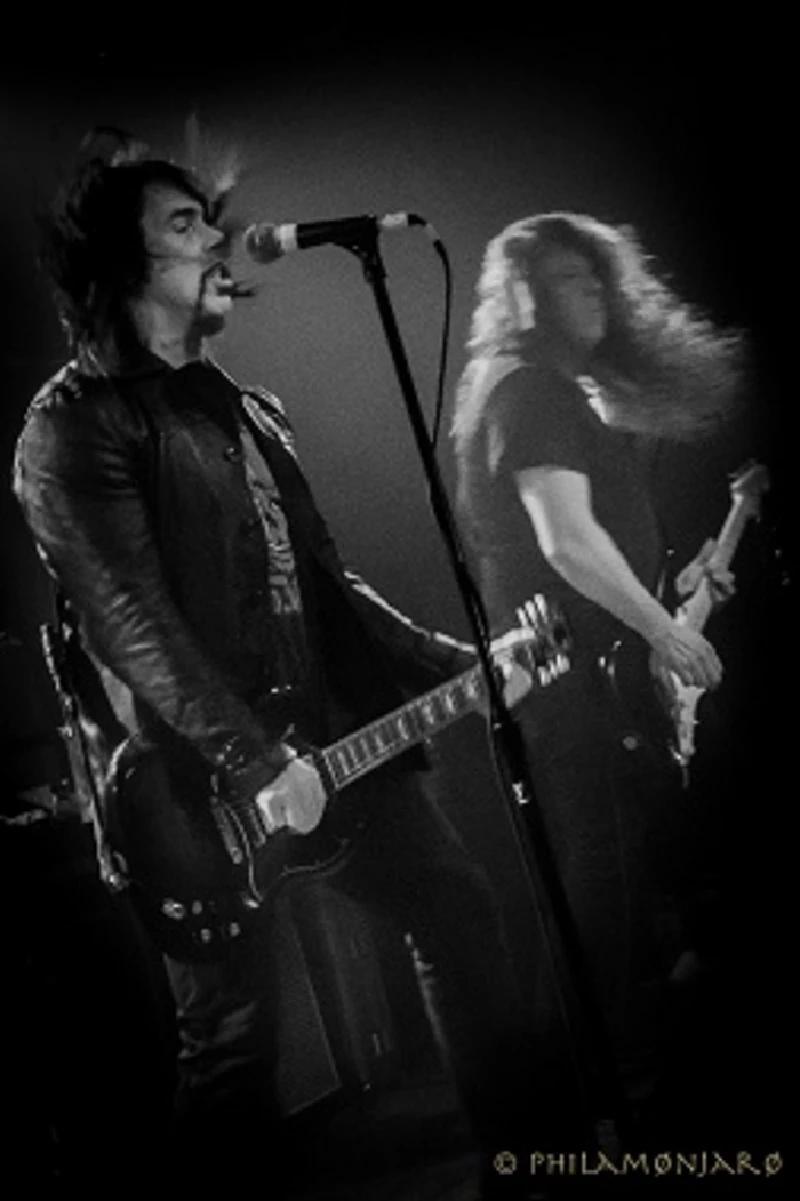
intro
Lisa Torem chats to Dave Wyndorf, the front man with New Jersey rockers, about their new album 'Milking the Stars: A Reimagining of Last Patrol', which features alternative versions of songs from their previous album
Dave Wyndorf is the primary songwriter, front man and one of the guitarists in the Red Bank, New Jersey-formed Monster Magnet. The stoner-rock group has undergone several line-up changes since its inception and Dave is the only remaining original member. Monster Magnet was named after one of his favourite childhood toys, which was popular in the 1960s. Their high-octane material has been heavily influenced by Black Sabbath, Alice Cooper and Hawkwind, and many of Dave Wyndorf’s originals have appeared in the following films: 'The Matrix', 'S.F.W.', 'Beowulf', 'Bride of Chucky', 'Talladega Nights: The Ballad of Ricky Bobby' and 'Heavy Metal 2000'. Dave also wrote the soundtrack to 'Torque' after having experienced the culture of Nevada. Their first full-length album, 'Spine of God', was released in 1991 after a series of EPs, but it was breakthrough album, 'Powertrip', which was released in 1998 that won them a gold record and featured the crowd pleasing mantra-epic 'Space Lord'. Their 1995 album, 'Dopes to Infinity' featured ‘Negasonic Teenage Warhead’, which has also become a cult classic. In the following decade, Monster Magnet dove into psychedelia, and proved themselves to be an extraordinarily prolific and experimental tour de force. After solely touring in Europe for a decade, Monster Magnet returned to the U.S. for a national tour last year in support of their album 'Last Patrol'. Dave claimed that the band had time limitations because of touring and didn’t devote enough time to the project, so this year they produced 'Milking the Stars: A Reimagining of Last Patrol', which features more elaborate versions of a few of those tracks as well as several contrasting originals. The band performed 'Dopes to Infinity' and 'Spine of God' in their entirety in 2011-2012 but the American tour was more reliant on songs from across their full discography. Besides Dave Wyndorf, the current line-up consists of guitarist/producer Phil Caivano, who first joined the band in 1998, left in 2005 and returned in 2008; drummer Bob Pantella; guitarist Garrett Sweeny and newest member and bassist Chris Kosnick, who came on board in 2013. Back for his second interview is the creative, leather-clad icon Dave Wyndorf to talk about Monster Magnet’s brilliant new animated video and why the new spin on last year’s release is worth celebrating. PB: What kind of reaction are you getting on your new animated video, 'The Duke', which examines nuclear warfare? DW: Pretty good. People seem to dig it. I love it. Phil Mucci is an incredibly talented guy and he got the whole concept of it. It’s pretty much the way it should be and I think just by the fact that it is something; it’s got depth to it, it’s got a story and people recognize it and they’re digging it. It’s not just the bells and whistles. There’s a really mysterious story there. PB: It’s historical. There’s a replica of the Enola Gay and a fierce main female character. DW: If I had the money, I’d hire Phil to just live in my house and do videos all the time. PB: The song, 'The Duke (Full On Drums and Wah') is an unique arrangement. There’s a percussion introduction, which I don’t think we’ve heard so much in Monster Magnet’s previous tunes. DW: Yep. Exactly. In the original 'Duke' there are just bongos and stuff to wrap the first half of the song and then the drums kick in. On this one, I rearranged the drums so it became like a full beat throughout the entire song. So, there’s a big drum intro. It just locks it up. It’s a little bit more representative of how we do it live as well. PB: 'Hellelujah Fuzz and Swamp' features some really, crazy weird and wonderful vocal work and, again. This version sounds unlike what Monster Magnet has done before. What was the inspiration? DW: 'Hellelujah' is one of those songs that, when I did it on 'Last Patrol'. it was kind of a throwaway track. There were time considerations. This always happens on a couple of songs. When I listened to it back, I thought, this is cool but it really should have been more vulgar. It should have been BLAGH with sloppy guitar. It should sound, ridiculously, like some white guy from New Jersey trying to sound like he’s from the Bayou and that means guitar too. That one I’m really happier with than the version on 'Last Patrol'. I wasn’t trying to beat out the record but I was definitely trying to go back and sew up some things that were left unsewn. PB: 'Stay Tuned Even Sadder' is kind of an apocalyptic tune. Does it reflect how you feel about where our culture is heading right now? DW: Yeah, sure. I don’t think I’m alone here. It ends on a positive note; it’s not a total apocalypse. It’s at least asking people to hold each other and love each other. It could have been like, "We’re all fucked. Just put a bullet in your brain. Oh, my god." But we’re just talking about how the more into the information age we go and the faster life goes, it really, really seems like the world is being shaped by a drunken barber. We put a lot of trust in America, especially in the last bunch of years since 911, in our leaders and our systems taking care of us and I just don’t think that’s true. They have to be kept on. They have to be hounded like dogs. You don’t trust these guys. You’re never supposed to really trust these guys. Look what happened when Reagan deregulated the banks. So, that’s what I’m talking about. It’s a scary world. Don’t kill yourself, but at the same time you may want to pay a little more attention to how things go down and less time just rah-rahing, spending a little more time inspecting how you live and why you live that way. PB: You mention “the death of cool” in it. Is it really dead? DW: My version of cool died a long time ago. PB: What was yours? DW: Mine was set up off of 1950s and ‘60s stereotypes that I had read in the 70s, which was “speak softly and carry a big stick,” be nice, but be prepared to be a bad ass if you have to and don’t always go for the money. Go for the right thing to do. It wasn’t the first inclination, like I’m just going to cash in. The version of cool that I see out there today that has been growing and growing and growing since the ‘80s and to the ‘90s is: Basically, it doesn’t matter how you get there but as long as you get there you’re good. The guy with the most toys wins. It’s like a corporate mentality that’s bled over into rock and roll and hip-hop especially, and it went so far as to kind of feed cynicism. I see so much cynicism, and, believe me, I’m one of the most cynical guys in the world, but not to the point that it’s going to rot me and I just get a feeling that a lot of people think, "Oh, well, it would be nice if it was good but at least they cashed in. At least they made a lot of money." Really? That’s where you’re going to leave this? It forgives a lot of sins -maybe not death dealing sins but sins of omission of quality, sins of purpose, of motivation. Motivation has always been there but that was always left for Hollywood moguls and mean managers, not for every artist. Even bands are like, “Yeah, I’m going to get corporate sponsors and I’m going to charge for meet and greets and every little thing.” Dude, I don’t know what that is but I know what it isn’t is - It’s not cool. So, that’s when I say the death of cool. I don’t see anyone even trying. PB: Monster Magnet does some great, extended psychedelic tunes and need an audience that stays the course and appreciates your musicianship, but some fans just want the vocal hook after ninety seconds. DW: We don’t do well with crowds that are used to being prompted. One, two, three, four YEAH! Now it’s more like: one, two, three, four, five, six, seven, eight, nine, ten, sixteen. What the fuck is this? PB: But that’s one of our alpha state refuges. We need that balance of time and space. DW: I totally agree. I don’t think it’s impossible for kids to like that. In fact, a lot of them do. You just don’t see them. PB: They don’t always have the opportunity. DW: There’s no surge, no cultural surge for that kind of exploration of music amongst the masses. In fact, we were totally lucky to have that happen in America at all. It was almost like a flash in the pan. PB: A fluke? DW: Not a fluke. It was kind of an offshoot of an enthusiastic youth culture, who was idealistic in a lot of ways that they aren’t today and it’s not anybody’s fault except for it’s just the way the cookie crumbles. I think the art part of it, the exploration, will come back — it’s probably going on right now but we just can’t recognize it in the snowstorm that is the internet and there’s no way to make it stick in one place because there’s no focus, but it will come back. I think it will be a fantastic time artistically in the next bunch of years, but it’s never going to hit where art meets commerce in that sensational way that it did happen in the '50s, '60s, '70s, '80s and probably ending in the '90s. It’s because it’s spread out all over the place, and I don’t think you’re going to find corporations and record companies sponsoring adventurous things. PB: Regarding 'Milking The Stars' I really like the idea of reimagining material that had already been recorded. It sounds like it’s a lot of fun for the entire band too to elaborate the second time around. We discussed your Donovan cover of 'Kingfisher' when we spoke to you last year. What did you do to extend it this time around? DW: It just had to be done. We were working that stuff up live. One of the longest songs we did on 'Last Patrol' was ‘Kingfisher’. It just seemed like it should rock on. It just didn’t seem like enough when we were practicing. Things really got to blow up. We can’t fade out like you do on a record so you got to go the distance — put some grand finale on it. We worked back and forth and it turned into this ultimate riff-rock jam out. It seemed totally appropriate. I was over the moon. This is great! PB: Shawn Phillips played sitar on Donovan’s original version. How did Monster Magnet go about replicating that texture? DW: We did it with an acoustic guitar and with some tone knob switch on the regular guitar. I’ve tried taking out a sitar before, but they break really easily. I may just break out my own electric sitar and play that next time. PB: You have an electric sitar? DW: I do. It’s really, really cool. It’s from the ‘60s so it’s very fragile but it sounds great. PB: You recorded the live versions in Belgium. DW: Yes, they were recorded at a place in Belgium called the AB. PB: Was that because there are harder rocking fans out there? DW: No. It was actually because they had a recording facility built into the place. PB: Monster Magnet has toured with Marilyn Manson, Aerosmith and Soundgarden. Do you have any touring stories? DW: Too many to count. Man, talk about riding the stereotype. It was fantastic. All I wanted to do when I was a kid was have rock and roll stories and I did and I got them really, really fast. Some of them are too blue to print. I remember touring with Marilyn Manson. It was a great tour, and he really lived up to being a rock star in the kind of way that you read about when you were a kid. He smashed hotel rooms and did thousands of dollars worth of damage in the dressing room, smashing televisions. Get out of my dressing room! It was that kind of stuff, really fun, and he was actually a nice guy. There were so many women. So many dressed up girls and the kind of stuff that your average superficial male would hold in high regard, for which I count myself as one at least for the time being. I really try to embrace the stereotype very hard, probably not to my eternal regret but to a little stall in the music there. Manson: fantastic, crazy, sexual debauchery. Aerosmith: absolutely fantastic. Nice people and probably some of the best rock musicians I’ve ever met. Touring with them was like an education in rock for everything from singing to drumming. You just watch each of those members and you walk away a better person. It was really, really cool stuff. PB: So do you think you’ll work on a memoir one of these days? DW: Maybe but I’m trying to figure out how to write the memoir without having a lot of people really hate me. In a lot of ways, with the Monster Magnet records I’ve been writing my memoir all the time and I think that’s why a long time ago I started disguising my words using metaphors because I’m talking about certain people that I just don’t have the guts to say to their face. Some people get to the point in their life where they say, "Fuck it. I’m writing it." I feel it’s coming. It might be coming soon. PB: When that happens, does that mean you’ve hit a stage in your life where you see things more clearly and you have peace within yourself or that you haven’t? DW: I definitely wouldn’t want to write something unless it was worthy of being written beyond, "Hey, I’m going to tell a dirty story," and that’s where it gets difficult because the dirty stories actually do mean something in the totality of the whole story. If I wrote my memoirs, some of that stuff was very important to me. The debauchery was very important, meaning that it represented some sort of need, whatever. It's life. PB: I heard a music critic say the other day that being in a band is like being married to three people. Is that true? DW: It’s a crazy thing. Every once in a while, I’ll sit there and realize that I’ve been sitting four inches away from this person for like months. It teaches you a lot about family. It’s a different kind of family but it is family — just the similar moods that people get in, how there’s a hive mind for a while and then it breaks up and it goes back in. It’s very much like a family. PB: A hive mind? DW: When you’re on the road, you’re basically looking for the same thing, which is, hopefully, a good show and the least amount of stress as possible, so that you can continue to bring your enthusiasm every night because that’s what the people care about. That’s what everyone should be — at their best come showtime - except it’s hard to replicate that over and over. The middle part, the part where you’re not on stage, can be very not exciting. There’s a lot of travel, so it’s a lot about the people you’re with and it’s pretty cool actually. I like it. PB: Do you see yourself reimagining other Monster Magnet albums in a similar way and, because your songs are so cinematic, do you see the band branching out into more film work? DW: Well, film work, I’m always up for that. And reimagining? In about two weeks? I’m doing ‘Mastermind’ right now, which was the previous album before 'Last Patrol'. The reason I’m doing this one, really more than the 'Last Patrol' one, is because I wasn’t happy with the final result. It was a little too slick, mix wise. I think I made some hurried decisions with a more modern type producer that I felt comfortable with. Just because I can do it, I’m doing it. That will be the next thing that comes out and I’m just finishing that now. Then I hit the road and tour. PB: You’re touring Europe. DW: Yeah. Beyond that it will be new Monster Magnet tunes and a whole new Monster Magnet record and maybe the movie stuff. PB: You’ve been known to put in fifteen-hour days of conceptualising and writing. Is it a matter of keeping focus and not stopping until you get results? DW: If it’s by myself that would just be my life, so I can poke in and out as I want. That means fifteen hours not sitting there with a guitar. It means maybe three hours sitting there making music and then two hours thinking about it, walking around, and thinking about it, but I can’t leave it alone. I come back and I just can’t stop and if that means that I have to stay up until five o’ clock in the morning until it’s finished then it’s done. When it’s an actual band situation, when I’ve got people there and there is studio time then it becomes real - You will sit in front of that desk for fifteen hours until this is all done because then it’s practical. What can I say? Sometimes it takes a long time and other times it doesn’t take much time at all. I keep hoping for it to take less time but there’s something about that long stuff; really, really most of it - for it to work you want to get the right sound and the right mood, and if that takes a couple tries, fine. PB: You talked about using metaphors in your lyrics earlier. Are there books you’ve read that have inspired that usage? DW: Probably the whole metaphor thing came early in life by reading Hunter S. Thompson who spoke in a lot of metaphors. He’d always exaggerate things, and I would listen to Jean Shepherd radio shows when I was a kid. He’d use a lot of metaphors. It’s just something that hit me. It just seemed like a good way. Plus I read a lot of comic books when I was a kid, too, and there are just absolutely sensational images and concepts in those things, which struck me as I wrote songs about my life — I was never very good at writing fantasy. I was good at making fantastic music and thinking it up, but when it came time to write I couldn’t write just story after story. I’m not a screenwriter. I’d have to sing about myself and I thought that was boring. I couldn’t tell a story like, “Yesterday I woke up and I watched TV and it wasn’t that good and then I met a girl and she didn’t like me and I wished there was something I could do.” It just sounded like bad country and western, but if I started explaining those things using visual terms and metaphors then it sounded like something. PB: So, to achieve this, would you ask your band to expand on your visual images or is it the other way around? DW: They kind of go together as I write a song. It gets things out. I’ll do a demo at home with the effects that are going to be on the song. It starts with the melody but not really the words yet. I have to work up the music and then finally put the words in at the end. The band, itself, from a practical standpoint, has to interpret the parts that I’m talking about and they more or less add to that with their own way of playing. I play the stuff out myself but it doesn’t sound nearly as good as when they play it. I’m a very limited player. I play a little bit of everything but very pedestrian. PB: But I think the thing about Monster Magnet is that there are some real hills and valleys in the music. The music can start out acoustically quite sparse, which is beautiful, and then it really builds and the great thing is that there are riffs that are immediately recognisable because they’re powerful. DW: Well, thanks. They’re probably the same riffs too. Like I said, I’m limited, but there are certain chord combinations, licks and styles that just tickle me so much that I just have to use them again and it’s like, if I get tickled by it once, why not use them again? The point with me is to juxtapose it with something that maybe hasn’t been done before in a Monster Magnet record or just use it in a way that, even though it’s familiar, it’s not going to call out to people like, What? He did it again. There’s a thin line between having to sing a true sound and just rehashing. PB: Do you listen to music these days? Do you even have time? DW: I listen to music all the time. I can’t believe people don’t have time to listen to music. It’s insane to me. I don’t have any time to listen to music. What do you mean? We listen to music all day like crazy. I listen to music all day and all night and when we’re on tour, all of us. PB: Will Monster Magnet tour the US again soon? DW: Hopefully in 2015 I’m going to get some dates in there but right now I’m so caught up in this 'Mastermind' thing and going to Europe. I’ll call my manager and say, “What do you got? Are people paying? Can we get a tour together in the States that makes sense?" I’m trying. PB: Thank you. Photographs by Philamonjaro http://www.philamonjaro.com
Article Links:-
http://www.philamonjaro.comBand Links:-
http://www.philamonjaro.comPicture Gallery:-
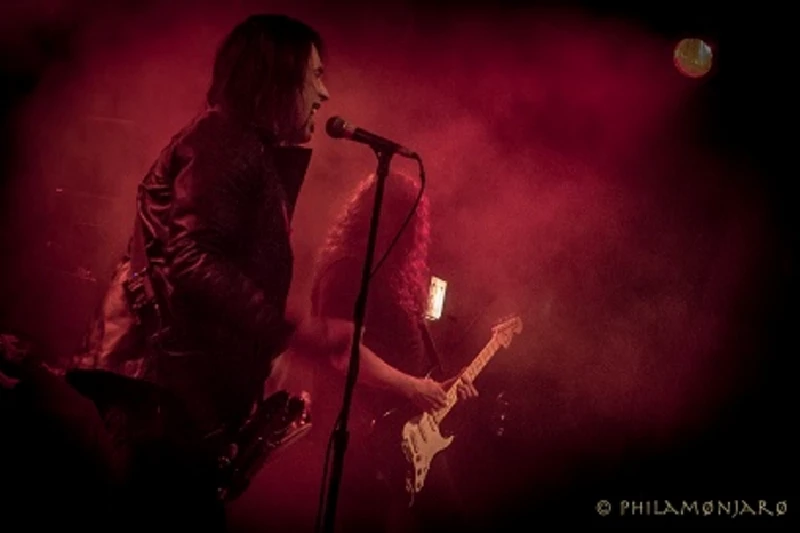
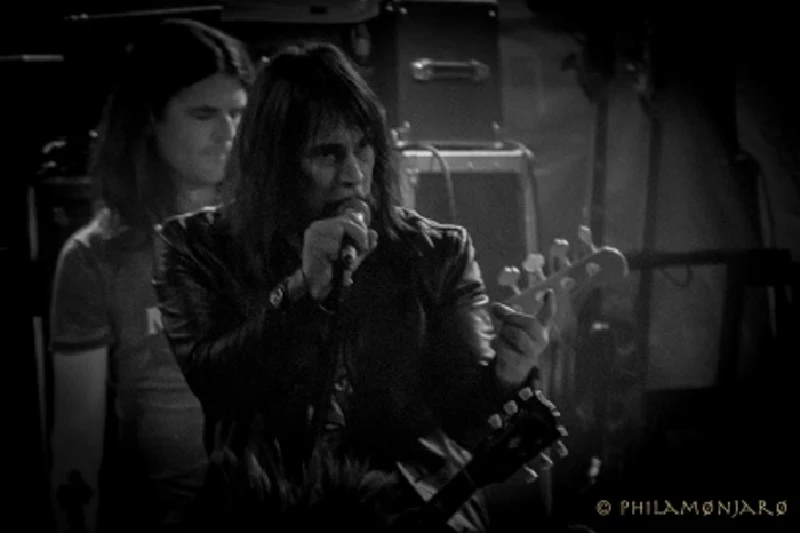
interviews |
|
Interview (2013) |
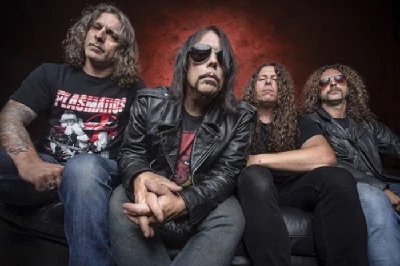
|
| Lisa Torem speaks to Dave Wyndorf from New Jersey-formed rock outfit Monster Magnet about their new album 'Last Patrol' and their decision to tour America for the first time in ten years |
live reviews |
|
Wolverhampton Civic Hall |
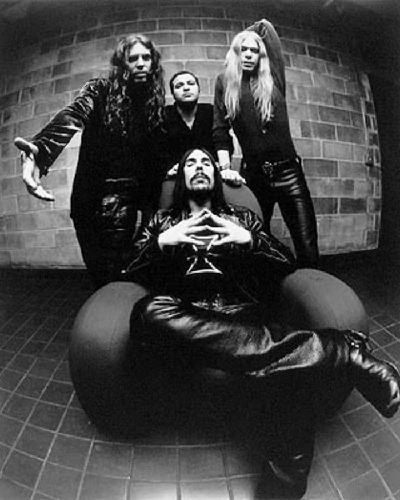
|
| If its classic rock cliché you’re after then there really only is Monster Magnet. They out tap Spinal Tap and they know it, but what’s more, they love it. Leader Dave Wyndorff, now finally sans the ri |
most viewed articles
current edition
Peter Doherty - Blackheath Halls, Blackheath and Palace Halls, Watford, 18/3/2025 and 21/3/2025Armory Show - Interview with Richard Jobson
Liz Mitchell - Interview
Deb Googe and Cara Tivey - Interview
Lauren Mayberry - Photoscapes
Max Bianco and the BlueHearts - Troubadour, London, 29/3/2025
Garfunkel and Garfunkel Jr. - Interview
Maarten Schiethart - Vinyl Stories
Clive Langer - Interview
Sukie Smith - Interview
previous editions
Heavenly - P.U.N.K. Girl EPBoomtown Rats - Ten Songs That Made Me Love....
Trudie Myerscough-Harris - Interview
Doris Brendel - Interview
Beautiful South - Ten Songs That Made Me Love...
Pulp - Ten Songs That Made Me Love...
Dwina Gibb - Interview
Kay Russell - Interview with Kay Russell
Barrie Barlow - Interview
Sound - Interview with Bi Marshall Part 1
most viewed reviews
current edition
Davey Woodward - Mumbo in the JumboNigel Stonier - Wolf Notes
Wings - Venus and Mars
Kate Daisy Grant and Nick Pynn - Songs For The Trees
Only Child - Holy Ghosts
Neil Campbell - The Turnaround
Philip Jeays - Victoria
Darkness - Dreams On Toast
Suzanne Vega - Flying With Angels
Charles Ellsworth - Cosmic Cannon Fodder
Pennyblackmusic Regular Contributors
Adrian Janes
Amanda J. Window
Andrew Twambley
Anthony Dhanendran
Benjamin Howarth
Cila Warncke
Daniel Cressey
Darren Aston
Dastardly
Dave Goodwin
Denzil Watson
Dominic B. Simpson
Eoghan Lyng
Fiona Hutchings
Harry Sherriff
Helen Tipping
Jamie Rowland
John Clarkson
Julie Cruickshank
Kimberly Bright
Lisa Torem
Maarten Schiethart